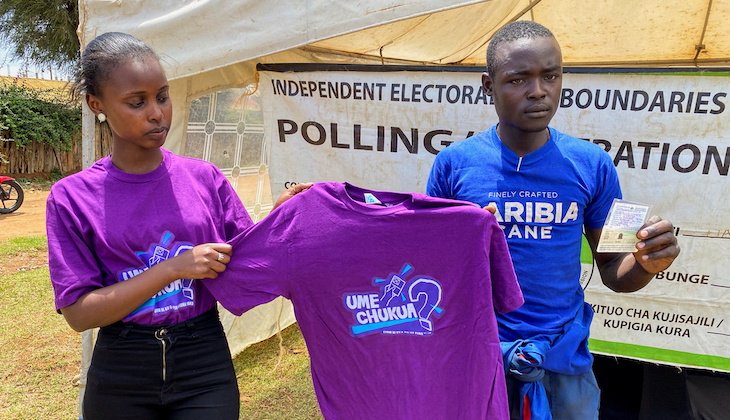[ad_1]
Initially, the two contenders appeared to agree that the electoral body should complement the electronic voter register and the manual one, but Ruto has changed his mind and is now rooting for pure electronic voting.
On 29 June, the duo and two other presidential contenders, George Wajackoyah and David Waihiga Mwaure, met the electoral officials to assess its preparedness. When it came to discussions on the voters’ register, the candidates disagreed, forcing poll officials to set another meeting for mid July.
Ruto said his Kenya Kwanza coalition fully supports the digital register: “We do not want a manual register.”
Raila, who is seeking the presidency for the fifth time, however maintained that the electoral body must retain a manual register, as backup, should the electronic one fail due to poor network, mainly in rural areas.
He also insisted that having both the manual and electronic register will guard against any attempts to rig the election: “ We want a manual register, we shall not accept anything else.”
What is IEBC saying?
The electoral body however said Raila should not be worried over the use of the electronic register because it’s a replica of the manual one.
Hussein Marjan, the IEBC chief executive officer, says using the digital register will reduce voter malpractices, which led to the annulment of the presidential results in 2017.
“We will only use the manual register as a last resort,” he said.
The decision to strictly rely on KIEMS as the only mode of voter identification is a violation of statutes and is susceptible to massive failure
With over 22 million voters registered for this year’s election, the electoral body says it will deploy 60,000 Kenya Integrated Election Management System (KIEMS) to identify and verify voters.
According to the IEBC, the system requires voters to use their fingerprints (biometric) for identification before they are given a ballot paper to cast their vote.
Court case against IEBC
Seven civil society organisations have since moved to court to challenge the commission’s stand on the electronic register.
Led by the Kenya Human Rights Commission (KHRC), the pressure groups say abandoning the manual register could also be disastrous as many Kenyans could be disenfranchised if the system fails at polling stations.
Furthermore, they argue that the decision by the IEBC is in violation of Section 44A of the Elections Act, which provides for provision of a complementary system of voter identification.
Kenya Human Rights Commission (KHRC) sues IEBC over its decision not to use a manual register, KHRC terms IEBC’s decision unlawful saying the decision may block over 2.5 million voters. #TV47News @eric_mnene pic.twitter.com/rmTJ2GpBgT
— TV47 Kenya (@tv47ke) June 22, 2022
“The decision to strictly rely on KIEMS as the only mode of voter identification is a violation of statutes and is susceptible to massive failure,” the pressure groups told the court in Nairobi.
Brian Wanyama, a political analyst and lecturer at Kibabii University, says the electoral body should ensure that technological and network problems experienced in 2013 and 2017 do not recur.
“ I advocate for both [registers] to [instil] confidence that this election will be free and fair,” he tells The Africa Report.
[ad_2]
Source link
